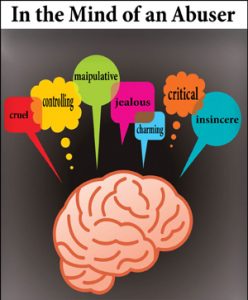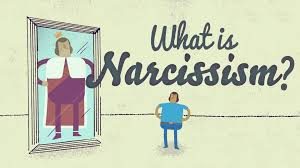
One of the hardest things to come to terms with when one is being or has been abused is that you were tricked and betrayed into thinking that the reason that you were being abused was your fault, but they won’t tell you why it is your fault. This causes anguish and excessive introspection as to what it could possibly be that you have done wrong. This is exactly what the abuser wants because while you are in a state of confusion you are much easier to control and punish.
At the same time that the narcissist is abusing you they will tell you that they love you! They use those words to lure you in so that they can betray, manipulate, objectify and exploit you for money, time, energy and attention. It is a bit like when someone deliberately speaks in a very quiet voice so that you have to physically lean towards them to hear what they are trying to say.
When you realise that you have been abused your whole perception of the world shifts. This is not an exaggeration as you have to reassess everything. How you present yourself to others, how others present themselves to you (knowing that this type of abuse is out there), what love actually means to you in all of its components, who you want to be around and who you don’t, the type of job you want to do and so on. Your entire belief system will be challenged and has to literally be rebuilt from its foundations so that you can learn to trust yourself, stop giving toxic people the benefit of the doubt when they display abusive traits and to treat yourself with compassion. In essence you have to reboot the entire system. It is an enormous amount of work and almost certainly the hardest job that you will ever do but it is worth it and so are you.
If you have grown up in a narcissistic family of origin this will be a much harder task because you will have had a life time of abuse and no healthy models to follow. There is no point in turning to your siblings for support because their view of the world is as distorted and jaundiced as yours was. Children of narcissistic parents will have lived their life being devalued and taught to accept abusive behaviour relationships. They have been traumatised by a person or people who have filled their brains with negative messages and these messages need to be identified and evicted so that you can move to a better place. This recovery takes a great deal of time (especially from a narcissistic family of origin), energy and education. Sometimes you will feel completely over whelmed by it all but remember you grew up with one or more emotional rapists and that is a huge thing to come to terms with.
When you start to recover from abuse you will find yourself experiencing cognitive dissonance, cognitive dissonance is a term that explains when a person has two conflicting beliefs or values that are vying for attention or validation at the same time. What we are all looking for is a model that says “I believe this and all that I see and feel around me fits in with what I believe”, when what you see and experience around you does not conform to your beliefs or your value system then a question or a hole in our system emerges and we strive to find a solution or correct this anomaly. The healthy way to deal with this is to reassess that which you previously thought. If you have been abused as a child, cognitive dissonance can threaten your core values and to preserve who you think you are or were told who you are, and if you are not ready to embrace change you can use denial, justification, hyper empathy and over thinking to stop the disharmony.
The next stage of recovery from abuse is to accept it for what it is/was. In the beginning of realising that you have been abused you will be in a state of shock “how could I not have seen this” etc. you might well blame yourself for being an idiot. That is an unnecessary step because you were manipulated by an expert and it was your kind, generous and forgiving nature that left you open to exploitation – don’t punish yourself for being that person.
After you have realised what has happened you might look around to friends and family for validation. This is probably the most precarious step of your recovery, because people who have not been through (or accepted in their own relationships what they are going through) will bombard you with a set list of platitudes (and a denial of your true experiences). These come in the form of:
- “Move on” (if you do not know what you are moving on from this will only cause problems in the future)
- “Forgive and forget” (if you do not know what you are forgiving then you cannot forget)
- “You are over reacting” no, you are not and if someone has not had the same experiences that you have had they have absolutely no idea of what they are talking about.
- “you are paranoid” (not)
So, now you know what is going/went on, the absolutely most important thing to do is to EDUCATE, EDUCATE, EDUCATE yourself. It is important to acknowledge that abuse does happen and it happens in every walk of life and very often the most cruelty a person will experience will be at the hands of family members. We have to embrace this new knowledge even though it is painful and hard to accept. It would be comforting to think that we are in “safe hands”, but we are not, we are being ruled by narcissists, psychopaths and maniacs who seek power beyond anything else. They are not thinking of or representing you, you are a mere object in a game that they are playing out in their head.
The final important thing to remember about abuse is that it will start when you are at a low ebb in your life. You might be a child and therefore powerless within the family unit, have just got divorced, lost a job, moved country or a parent might have just died. It is at the moment when you most need love and support that the narcissist will move in to start the abuse. Why do they do it at these already traumatic moments? Because they can, because it is much easier to bully someone who is already vulnerable and because narcissists are fundamentally lazy and why go for a tough target when they could abuse a soft one so much easier. If someone suddenly starts to shower you will an inappropriate amount of attention in these moments, be aware that it just might not be as it seems.



